Search the Special Collections and Archives Portal
Search Results
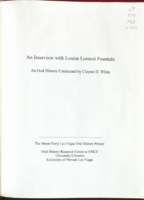
Transcript of interview with Louise Lorenzi Fountain by Claytee D. White, March 30, 2004
Date
2004-03-30
Archival Collection
Description
Louise Lorenzi Fountain was born on Nov. 14, 1913, to David Lorenzi, a French immigrant, and Julia Travese Moore from La Belle, Missouri. Her younger years were devoted to helping her father develop and manage Lorenzi Lake Park, which was built by Lorenzi and is considered a primary landmark in the development and life of the citizens of Las Vegas. Louise Lorenzi's father has been noted as one of the 100 most influential citizens of Las Vegas by the Las Vegas Review Journal. He opened the park in 1926 with a pair of man-made lakes and a swimming pool, dance hall, band shell and other amenities. In the interview, Louise talks about her father and mother and describes Las Vegas during its early years. Louise Lorenzi married Edgar Fountain in 1936. He had hitchhiked from Georgia in search of work on the construction of Boulder Dam, now Hoover Dam. The couple left Las Vegas for 10 years and lived in Grand Coulee, Washington, where he helped build Grand Coulee Dam. After returning to Las Vegas, Louise became a full partner in several business ventures the couple started. Those included the Nevada Amusement Co., a collection of 35 coin-operated phonograph machines; Frontier Radio and Appliance Co.; and later a television sales business; partnerships in two soft-drink bottling companies and a Toyota dealership. Louise Lorenzi Fountain was active in two Methodist churches and was a member of the First Presbyterian Church. She was a charter member and regent of the Valley of Fire Chapter of The Daughters of the American Revolution. Louise Lorenzi Fountain passed away on January 29, 2006 at 92 years of age.
Text

Transcript of interview with Pauleen Foutz by Don Scott Kaye, February 25, 1980
Date
1980-02-25
Archival Collection
Description
On February 25, 1980, Don Scott Kaye interviewed genealogist Pauleen Foutz (born November 26, 1906 in Provo, Utah) at her home in Las Vegas, Nevada. Foutz relocated to Nevada with her husband, who was a dentist, and raised her children in Las Vegas. Her children attended the Fifth Street School and later Las Vegas High School. She mentions that while her children attended middle school and high school in Las Vegas there was no problem with segregation. She also describes how Strip orchestras would provide entertainment for the children in the Las Vegas community by playing for their dances, such as junior proms and senior hops. During the interview, Mrs. Foutz discusses the history of Southern Nevada, social and religious activities in Las Vegas, her interests, extracurricular activities for local youth, and home and family life. While living in Las Vegas, professions she has held include schoolteacher, businessperson, and genealogist. She was involved with the Bicentennial celebrations in Las Vegas in 1967 and was very involved with the establishment of the Church of Jesus Christ of Latter-day Saints, genealogical library in Las Vegas. At the time this interview was conducted, Mrs. Foutz was the president of the Daughters of Founders and Patriots of America for Nevada.
Text
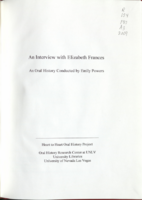
Transcript of interview with Elizabeth Frances by Emily Powers, July 22, 2008
Date
2008-07-21
Archival Collection
Description
Elizabeth Frances, born in Laramie, Wyoming in 1931, was the fourth of nine children. Her father was a plasterer until WWII, when he went to work in the shipyards in Washington State. The family then moved to Salem, Oregon, and Elizabeth attended high school there through her junior year. She actually finished high school in Saratoga, Wyoming, becoming the first of her siblings to graduate. Elizabeth married the same year she graduated (1949) and followed her husband's quest for work to Oregon and California. It was in Santa Rosa that she entered into university course work for her LPN degree. Once they moved to Las Vegas, she entered the LPN program at Southern Nevada Memorial Hospital (now UMC) and graduated in 1965. During her five years in the ER at Memorial Hospital, Elizabeth entered the two year RN program at UNLV, graduating in 1971. She left the hospital to work for Dr. Fink for two years. She shares descriptions, explanations, and anecdotes about her time there, including much of the on-the-job training she received from the doctor. In 1973, Elizabeth was offered the opportunity to teach at the LPN school she had started with, and she also went back to UNLV for her baccalaureate degree (1977). She worked for Workmen's Compensation for four years and details the team components, job requirements, and the new-found respect that the teams garnered from doctors. Elizabeth was called to Sunrise Hospital in 1978 to fill a new position under the education department and worked there for 18 years. Though she has seen many innovations in medicine due to advancing technology, Elizabeth believes that basic nursing skills involving observation and knowledge of the patient are still of primary importance. After retirement, Elizabeth began working full time for the museum in Lorenzi Park. She worked in all areas and was docent for many years. She and other docents created their own program and study, travel, and read to further their art education. Elizabeth paints in oils and watercolors, has held exhibitions, and recently built an art gallery in her own home.
Text

Transcript of interview with Dorothy Frassmann by Dennis McBride, September 21, 1997
Date
1998-05-14
Archival Collection
Description
Born in Brooklyn, New York on October 29, 1931, Dorothy Frassmann talks about her life and experiences.
Text
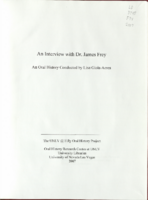
Transcript of interview with Dr. James Frey by Lisa Gioia-Acres, February 14, 2007
Date
2007-02-14
Archival Collection
Description
James Frey was born in Eureka, South Dakota, in 1941. His father worked in creamery and his mother was a registered nurse. When James was nine, the family,including his twin sister, relocated in Sioux Falls where his dad was plant manager for a dairy. He joined the YMCA in the fourth grade and ended up working for them until James attended Augustana College in Sioux Falls, graduating with a major in sociology and a minor in history. After graduation, he worked for three years at the YMCA in Sioux Falls as program director. He earned his master's degree in sociology at the University of Iowa in two years, and was hired at the YMCA in Whittier, California, where he worked for three years. While working in Whittier, James was offered a fellowship to Washington State University in Pullman. He committed to completing his doctorate in three years, and while still working on his dissertation began sending out applications. He sent one to UNLV and arrived in Las Vegas for an interview in 1974. James was hired as assistant professor of sociology at UNLV, and immediately established a survey center at the university. He also converted his dissertation into a book length manuscript and had it published, followed by other books and articles over the years. He conducted a survey on a very high-profile political race between Sheriff Ralph Lamb and his opponent, John McCarthy, which led to work for the State of Nevada, Yucca Mountain, and other entities. The survey program was eventually named the Cannon Center for Survey Research, after Senator Howard Cannon. In the course of his career, James was tenured, taught in London under a university sponsored program, spent a sabbatical in Washington, D.C., doing research, taught several classes, and served seven years as dean. He has detailed memories of the contributions of several university presidents, including Brock Dixon, Pat Goodall, Robert Maxson, Kenny Guinn, and Carol Harter. Today, Dr. James Frey and his wife of over thirty years, Carol, are both retired. He has made a smooth transition to president of his Rotary Club, Chairman of the Nevada Humanities group, and spectator at UNLV basketball and football games. He and his wife plan to stay in Las Vegas, close to their son and friends and neighbors they know and love.
Text
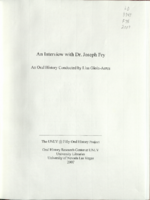
Transcript of interview with Dr. Joseph Fry by Lisa Gioia-Acres, October 09, 2007
Date
2007-10-09
Archival Collection
Description
Dr. Joseph "Andy" Fry is currently a professor of history at UNLV. He was born and grew up in West Virginia, the only child of an insurance salesman and a public school teacher. His parents met in Ronceverte, West Virginia, and lived for a while in his grandmother's boarding house. He had an idyllic childhood in this small town of 2500 people. Andy received an excellent high school education, including learning eighth grade English and 2 years of Latin from his mother. After graduation, he was interested in playing college basketball and ended up at Davis and Elkins College in east central West Virginia. Undecided on a major at first, he tried math and then chemistry, but he found his niche when he began studying the history of western civilization. During his undergraduate years, Andy met his wife-to-be, Sandra Schwitzer, and they were married in 1969 in the summer after their senior year. He was accepted at graduate school in history at the University of Virginia, so he and his bride moved to Charlottesville. After that, he worked for 2 years at Virginia Tech. In 1975, Dr. Fry was offered a job at UNLV, so he and his family packed up and moved to Las Vegas. He was welcomed to the history department by such notables as Roman "Jay" Zom, Ralph Rosky, and Tom Wright. In addition to teaching, he has had the opportunity to do research, write 4 books, and edit a series of diplomatic biographies. Andy was department chair in the mid 80s and again from 1999 to 2002. He also served for three years as executive assistant to Dr. Carol Harter (president of UNLV for 11 years), but prefers teaching over administrative work. His plans for the future are to finish a fifth book and continue teaching to at least age 66.
Text
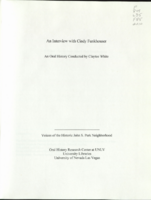
Transcript of interview with Cindy Funkhouser by Claytee D. White, January 14, 2010
Date
2010-01-14
Archival Collection
Description
Cindy Funkhouser grew up in the Midwest where she developed an early interest in "old stuff' as she refers to it. Her self-education in antiques spawned her business, Funk House, which she opened in 2001. Cindy is one of the forces behind the Downtown's arts movement and the development of First Friday, which was inspired by her observations of a similar event in Portland, OR. Cindy moved to Las Vegas around 1980. Her parents had moved to the valley in the late 1970s. When not working as a cocktail waitress at the Four Queens—a downtown casino where she was employed for 14 years—she pursued her interest in vintage items as a part-time business. Today others look to Cindy as a motivator for First Friday and the Las Vegas art movement that is deeply rooted in the John S. Park Neighborhood's sense of community.
Text
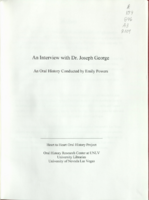
Transcript of interview with Dr. Joseph George Jr. by Emily Powers, April 8, 2008
Date
2008-04-08
Archival Collection
Description
Dr. Joseph George, Jr., was born, raised, and educated through high school in Sudlersville, Maryland. He describes his college career at the University of Pennsylvania and earning his MD degree at University of Maryland in Baltimore. There were only 15 students in his high school class and 114 in his medical class. After graduation and two years of country medical practice, Dr. George joined the Army in 1942 and became a flight surgeon. His duty assignments took him to Africa, England, and St. Petersburg, Florida, doing physical exams for pilots and flight crews and treating soldiers with mental problems. He was discharged in 1945 and headed for California, but describes his change of mind when the train arrived in Las Vegas for a brief stopover. Dr. George liked what he saw, a typical small western city, and decided to stay. He mentions the original hotels and hospitals and names many of the doctors he knew in the forties and fifties. He opened his family practice in an office on Fourth and Carson and later moved to a location on East Sahara. Over the next forty or so years he delivered more than 6,000 babies at various hospitals in Henderson and Las Vegas. Dr. George shares several anecdotes and stories, names a few notable Las Vegas patients, and comments on historical incidents that occurred here. He gives his opinions on changes he has seen in medical practice and the need for improved psychiatric care in the valley. He also talks about keeping in touch with former patients, high school classmates, and the members of his medical class at University of Baltimore.
Text
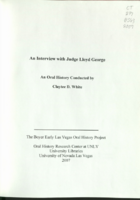
Transcript of interview with Judge Lloyd D. George by Claytee D. White, June 15, 2005
Date
2005-06-15
Archival Collection
Description
Judge Lloyd D. George was born on February 22, 1930, in Montpelier, Idaho. He attended grade school and high school in Las Vegas, Nevada, and earned his B.S. degree from Brigham Young University in 1955. Later that same year, He entered the United States Air Force and worked as a fighter pilot in the Strategic Air Command. In 1958, he concluded his military service as a captain. And in 1961, George earned his J.D. from the University of California at Berkeley. Judge George was admitted to the Nevada Bar in 1961 and began practice in Las Vegas. After 11 years in practice, he began on the path to Chief Judge: In 1974, he was appointed by the Ninth Circuit to preside over the United States Bankruptcy Court for the District of Nevada for a term of fourteen years. In 1980, Lloyd became a member of the Ninth Circuit Bankruptcy Appellate Panels and in 1984, President Ronald Reagan appointed him to the United States District Court for the District of Nevada. On July 15,1992, George was elevated to Chief Judge of the Nevada District. During his tenure on the bench, Chief Judge George held a variety of distinguished memberships. He was a board member on the Federal Judicial Center, a member of the National Bankruptcy Conference, the Chair of the Judicial Advisory for Bankruptcy Rules, the Chair of the Judicial Committee on Administration of Bankruptcy System, a Fellow at the American College of Bankruptcy, and a member of the Judicial Committee on International Judicial Relations. Judge Lloyd George is a highly respected figure in Southern Nevada and has given us a truly intriguing interview.
Text
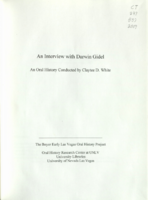
Transcript of interview with Darren Gidel by Claytee White, October 21, 2009
Date
2009-10-21
Archival Collection
Description
Darwin Gidel, born in 1924, grew up in Rockwell City, Iowa. He describes his childhood activities, schooling, and the jobs he held as a teenager. After graduating from high school in June of '42, Darwin immediately joined the military. His basic training took him from Minneapolis to Missouri, after which he was stationed in Nebraska, California, Florida, and South Carolina for further training. As he recalls his early military training, Darwin also evokes the patriotic fervor that gripped the country. He shares stories about the kindnesses he and many other enlistees received from individuals and families, ranging from rides to dinners to overnights. Darwin's overseas assignment was in London, England, beginning in November of 1943. He vividly recalls the bombing raids he flew and describes them from beginning to end. His B-l 7 was shot down over Belgium in March of 1944, and he and eight other crew members were held as POWs for eleven months. Much of Darwin's incarceration was in a Luftwaffe Hospital in Brussels, where his injured leg was removed. His memories include hospital personnel, solitary confinement, interrogation, and later being moved around to many different prisons in Germany. He clearly recalls relationships among prisoners, the configuration of German prisons, types of food served to inmates, and finally his repatriation from Annenberg Castle in Germany. After the war, Darwin earned a degree in accounting on the Gl Bill, which eventually led to general administration work in Sacramento. Along the way he married and had four children. After his wife passed away in the late seventies. Darwin eventually relocated to Las Vegas and remarried. He describes the city, recalls the small town atmosphere, and compares the impersonal bottom-line attitude of modem casinos to the folksy, welcoming feel of those establishments in the early eighties.
Text
Pagination
Refine my results
Content Type
Creator or Contributor
Subject
Archival Collection
Digital Project
Resource Type
Year
Material Type
Place
Language
Records Classification
